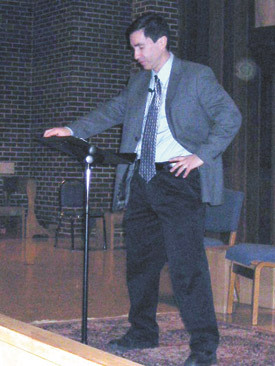
FAYETTEVILLE -- It's a common association, but consumerism is not so much about greed as it is restlessness and dissatisfaction.
That was a challenge theology professor William T. Cavanaugh recently presented to a Fayetteville audience.
Cavanaugh, an associate professor of theology at St. Thomas University in St. Paul, Minn., spoke March 5 at St. Thomas Aquinas University Parish at the University of Arkansas as the 2009 Lenten theology lecturer. Organizers hope to bring in other speakers at least annually for thought-provoking talks.
Cavanaugh didn't disappoint. He is an engaging speaker and his topic (he's written a book by the same name), "Being Consumed: Economics and Christian Desire," was timely, both for the religious season of Lent and for the current economic meltdown.
Greed is usually an "inordinate attachment to things," Cavanaugh explained. But consumer attachment is more about spending. People, he said, have a "remarkable ability to be detached from things." While society has become detached from both production and producers, products have become more humanized. The most mundane products become attached to evocative symbols and consumer desire "has to constantly be on the move."
The razor is among his favorite examples, Cavanaugh said. A single-blade safety razor once did the job. It was replaced by two blades, later three, eventually four and today there's a five-blade razor on the market.
Or, "how can we be content with an iPod that only downloads 1,000 songs" when there's one available that can hold 2,000 songs, he added.
He noted the 2005 example of a Nebraska college student who "sold" his forehead as advertising space. For 30 days, the young man wore a temporary tattoo touting the benefits of a snoring remedy in return for a $37,000 fee. The consumer culture, Cavanaugh said, can "turn virtually anything into a commodity, something that can be bought and sold." And, "our relationships with things tend to be short-lived ... constant dissatisfaction with goods."
The consumer culture, Cavanaugh continued, is "not so much about having more, but about having something else." Modern marketing since the late 19th century has helped plant the idea that we need something else.
He cited marketing campaigns as examples of creating the desire for more or different goods, including one promotion for bottled water -- for pets. "Your dog that, if you leave the seat up, will drink from your toilet, will happily drink from your toilet," Cavanaugh said.
"Every day, millions go hungry" drew groans as the audience realized the ad for Nexxus hair products was referring to hair follicles, not to people.
In modern society, people are detached from production and the producers as well as from the products, Cavanaugh said. Before industrialization, people produced things they needed -- food and clothing -- at home. Now, those things are made elsewhere, and in many cases, far away.
"We used to make things and now we buy them." Fewer Americans work in factories today, making production even more distant, he continued.
He argued that "work is meant to be an outlet for creativity," and he quoted Pope John Paul II, who had proclaimed that "work is a good thing for humans" through which they find fulfillment.
Americans no longer think of production in terms of skills but in terms of labor costs, Cavanaugh said. Production jobs that were moved to Central America for cheap labor are now being moved to Asia for even cheaper labor.
"We shop and they drop," he said, referring to poor working conditions for some workers. "Often times, it's hard to see the connection ... They're on the other side of the world."
The disconnect is huge. "We spend two days of (their) wages on a cup of coffee."
The system is good, he continued, at producing large volumes of goods. Traditionally, people worked to obtain what they needed and then they'd relax. In modern society, people have been trained to work more "so you can get more stuff."
"You have to teach people to be consumers," Cavanaugh said.
He suggested that each new purchase is a renewal, "an attempt to escape death, an attempt to escape time."
"Ultimately, everything falls apart ... becomes useless. We die. ... That's the clincher. ... Only God stops the decay of time."
Cavanaugh was clear that he wasn't condemning all consumerism or that it holds no virtues.
"Occasions have to be judged on a case-by-case basis. The question is: When is a market transaction free and when is it not?" He added "taking advantage of someone's desperation is not freedom."
"As Christians, we don't need to say business is bad. We need to go into business so real freedom can take place."
Please read our Comments Policy before posting.
Article comments powered by Disqus St. Paul says: How does the Bible define love?
St. Paul says: How does the Bible define love?
 6 steps to getting married in Diocese of Little Rock
6 steps to getting married in Diocese of Little Rock
 Most frequently asked questions on Catholic marriage
Most frequently asked questions on Catholic marriage
 St. Timothy winner recommends adoration to other teens
St. Timothy winner recommends adoration to other teens
 St. Joseph a model of solidarity with immigrants
St. Joseph a model of solidarity with immigrants
 Two gifts after Jesus’ death: Virgin Mary and Eucharist
Two gifts after Jesus’ death: Virgin Mary and Eucharist
 Why we have an altar, and not just a communion table
Why we have an altar, and not just a communion table
 Pope: Wars should be resolved through nonviolence
Pope: Wars should be resolved through nonviolence
 Living relationship with Jesus Christ in the Eucharist
Living relationship with Jesus Christ in the Eucharist